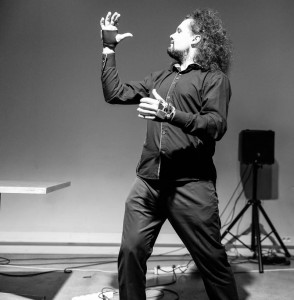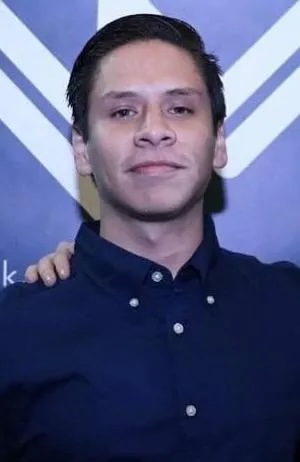Great, thanks a lot !!
A good way of experimenting with the stuff is to use NodeProxyGui2, and hit the random or vary button.
(
~getNodeProxy = { |synthDefName, initArgs=#[], numChannels = 2|
var synthDef = try{ SynthDescLib.global[synthDefName].def } ?? {
Error("SynthDef '%' not found".format(synthDefName)).throw
};
var nodeProxy = NodeProxy.audio(s, numChannels);
nodeProxy.prime(synthDef).set(*initArgs);
};
~createNodeProxyGui = { |nodeProxy, excludeParams=#[], ignoreParams=#[]|
NodeProxyGui2(nodeProxy)
.excludeParams_(excludeParams)
.ignoreParams_(ignoreParams)
};
)
x = ~getNodeProxy.(\simplePulsarPM, [\sndBuf, ~sndBuf.bufnum, \modBuf, ~modBuf.bufnum]);
~createNodeProxyGui.(x, ignoreParams: [\sndBuf, \modBuf]);
Awesome, I was able to find all the functions and it’s working! Thanks again!
Next week we’re talking SC + hardware - how exciting! First, we’ll hear from @MarcinP:
Marcin Pączkowski (pronounced “marr-cheen pawnch-koav-skee”) is a composer, conductor, digital artist, and performer, working with both traditional and electronic media. As a composer, he is focused on developing new ways of creating and performing computer music. His pieces involving real-time gestural control using accelerometers have been performed worldwide, including International Computer Music Conference in Daegu, Korea, Music of Today concert series in Seattle, Washington, Northwest Percussion Festival in Ashland, Oregon, Toronto International Electroacoustic Symposium in Toronto, Canada, and the Audio Art festival in Kraków, Poland.
As the Music Director of Evergreen Community Orchestra, he presents concerts of diverse repertoire to local communities. He is also involved in performing new music and has led premieres of numerous works in Poland and the United States. His conducting performances with Inverted Space ensemble include Anahit by Giacinto Scelsi, featuring Luke Fitzpatrick on violin, Flurries by Brian Ferneyhough, and Hermetic Definition by Joël-François Durand. He is also active in the Seattle-area improvised music community performing on various instruments.
He received grants and commissions from Seattle Symphony, eScience Institute, Adam Mickiewicz Institute, and from Polish Institute of Music and Dance. He received his Ph.D. in Digital Arts and Experimental Media (DXARTS) from the University of Washington in Seattle, Washington. He also holds Masters’ degrees from the Academy of Music in Kraków, Poland, and from the University of Washington.
//
At the Notam SC meetup I’ll talk about my work with motion sensors and SuperCollider. Additionally I’ll show some SuperCollider quarks/extensions I’ve used in my projects.
Here’s a video recording of my piece that uses motions sensors with SC.
Also presenting next week: Diego Ortega!
Sound artist, creative coder, and rock musician with 15 years of experience in music performance and 10 years as a software engineer. I hold a degree in Digital Music Production Engineering from Tecnológico de Monterrey. My artistic work explores the intersection of mathematics, programming, and sound, notably using platforms like Mathematica and Supercollider to convert mathematical functions into sonic expressions. Through projects such as Wolfram Amadeus and writings like Music of Mathematica, I investigate how abstract computation can become a tool for musical creativity. My practice blends audio programming, web development, and experimental sound design into immersive, data-driven experiences.
//
Based on my relationship with Blokas.io and my prior work with Wolfram Amadeus, I am developing a guitar pedal that uses the Raspberry Pi and Blokas Pisound. This hardware will be integrated with software served from the cloud to modify the guitar’s sound. The purpose of this guitar pedal is to become a product that extends the musician’s capabilities. This product will evolve from a prototype to a platform whose hardware will be optimized for the specific use cases of a guitar pedal. The hardware iteration may be accompanied by different communication protocols aimed at increasing the speed and reliability between the guitar pedal and the cloud.
Meetup starting now - see you there!
Our last meetup before the summer will happen on Wednesday! We’ll hear from @julian:
A walkabout between music informatics and epistemic media.
Julian Rohrhuber works in an interdisciplinary field that combines philosophy, informatics, anthropology and art. Together with his students in Düsseldorf, he develops art as a form of theory as well as teaching as a mode of research. As a member of the community, Julian (telephon) has followed the development of SuperCollider for a long time, contributing both to its formal and improvisational character.
I have always found sound programming interesting as a way to learn by experiment, to collaborate and play with people in different disciplines. Helping out in the SuperCollider project has meant to contribute and develop ideas that come from my mixed background. For this presentation, I would like to focus on the early inspirations that led to the live coding movement in computer music and discuss what role they play in our work in the research in music informatics and epistemic media. Also, I would like to discuss conceptual decisions in the development of SuperCollider. If the audience is interested, we can touch upon some related topics covered in projects and publications.
Websites:
- ~rohrhuber
- publications by Julian Rohrhuber
- Git repositories: telephon (Julian Rohrhuber) · GitHub | musikinformatik · GitHub | Julian Rohrhuber · GitLab
some relevant publications:
- The Meaning of Live: From Art Without Audience to Programs Without Users
- Algorithms Today
- Generic Additive Synthesis
- Laboratory Methods for Experimental Sonification
- https://publications.rwth-aachen.de/record/770430/files/770430.pdf
Works:
…and our last presenter before the summer is @lnihlen!!
Lucile Rose Nihlen (she/her)
By day, Lucile is a technical lead on a compiler team at a large tech company. By night, she is the lead developer of Hadron (hadron/hadron: A rust re-implementation of the SuperCollider music programming language and tooling. - Codeberg.org), a Rust re-implementation of SuperCollider. In her spare time she enjoys working on Hadron, martial arts, cooking and eating. She lives in a Toronto suburb with her wife, dog, and two cats.
In this talk Lucile will present an overview of Hadron, an early work-in-progress Rust reimplementation of the SuperCollider interpreter, synthesizer, and development environment. She’ll cover project plans for all the main components, current status, and some rough project plans. She’ll give a short demo of the web deployment at https://hadron.run, followed by a call for volunteer contributors, and finishing with time for questions.
Our last meetup before the summer is starting in 10 minutes - see you there!
Hello, hello,
would like to explore, but I get this error. Is
ERROR: Message 'helperFunctions' not understood - ~grainFunctions is not in scope of your snippet. Can you share the whole working example?
Thank you!
hey, to run the example you have to create the intial Prototype from my thread here:
Just copy and paste what you find there and make sure you have the ProtoDef class installed.
The Prototype ~grainFunctions = Prototype(\grainFunctions); has to be evaluated before you evaluate the example SynthDef.



